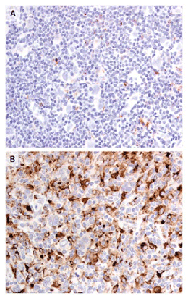Wow! The BC Cancer Agency announced another breakthrough out of its Centre for Lymphoid Cancer – you may have read it this morning on the front page of the Vancouver Sun.
The research was published in the New England Journal of Medicine, and shows a promising new tool in predicting treatment outcomes for patients with Hodgkin Lymphoma.
Hodgkin Lymphoma mainly affects young adults, and has a good survival rate – with about 75 to 85 per cent of patients cured in their initial treatment.
But, the other approximately 25 per cent of Hodgkin patients will experience a relapse. And about half of those relapses will not be cured.

Panel A shows a sample obtained from a patient in the treatment-success group, with few CD68+ macrophages, and Panel B shows a sample from a patient in the treatment-failure group, with many CD68+ macrophages. Both patients had the nodular sclerosis subtype of Hodgkin’s lymphoma.
Using the same next-generation technology at the Genome Sciences Centre that has been key to other recent breakthroughs, they’ve discovered that the number ofmacrophages in a patient’s tumour has a correlation to the outcome of their treatment.
The more macrophages present, the more likely a patient will relapse.
Macrophages are a type of white blood cell that act as scavengers – they normally get rid of the bad stuff that the body wants to eliminate. But in some patients with Hodgkin lymphoma, the macrophages are misdirected and the cancerous cells are allowed to flourish.
This breakthrough has real promise for cancer patients. It could allow oncologists to recommend more intense treatments initially for patients with a strong likelihood of relapse (i.e. high number of macrophages) or they could recommend less intense therapy – with fewer future side effects– for those with few macrophages present.
As per the editorial in the New England Journal of Medicine from one of the leading experts in the field of lymphoma research, Dr. Vincent T. DeVita.
He basically says that there have been no advances in treatment options for lymphoma for 20 years, because of the lack of a reliable predictor for treatment response – and the BC Cancer Agency may have just discovered it.
Once again, BC Cancer Foundation donors are a part of this discovery – and we thank you. From the ground up you have supported the Research Centre, the Genome Sciences Centre and have given generously to lymphoma research. This year’s Inspiration Gala in October will also be raising funds for lymphoid cancers – we can’t wait.
Warm regards,
Doug


